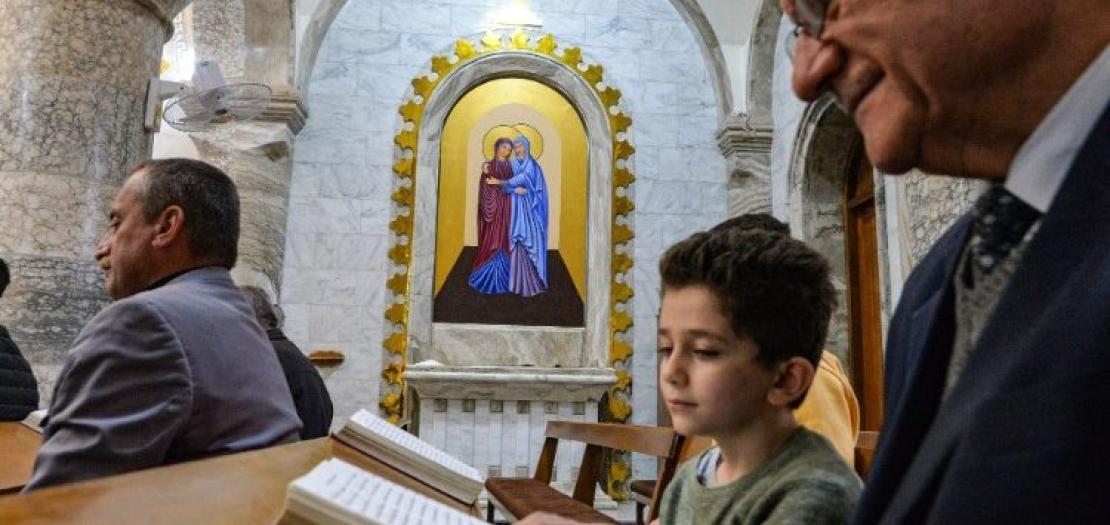Issued by the Catholic Center for Studies and Media - Jordan. Editor-in-chief Fr. Rif'at Bader - موقع أبونا abouna.org
A logical question: "Where did the Christians of Iraq go?"
The Holy Land Christian Ecumenical Foundation (HCEF) has posted an article questioning the alarming slump in the number of Christian Iraqis which has been going on at a steady pace.
"The Iraqi Christians have over nearly two millennia been a thread in Mesopotamia’s history. Starting from the monasteries of Nineveh to the churches of Baghdad and the mountain villages of the north, while preserving their language, art, and liturgy carry the heritage of vanished civilizations," according to the report.
According to statistics, Iraq’s Christians before 2003 war--mostly Chaldean Catholics, Assyrians, and Syriac Orthodox--were estimated at between 1.2 and 1.5 million, while over two decades their numbers dropped to under 250,000, according to estimates.
This huge drop in the number of Christians is subject to consideration and profound analysis. Basically, this followed the US invasion of which culminated by 2014 and the following years in the aftermath of the ISIS militants seizure of Mosul when Christians faced hard and intolerable situation with life and future turning topsy-turvy.
Effective 2025, reports estimate that fewer than half of those displaced have returned, with most relying on local protection units or church-organized initiatives.
It is really dolorous to note that extremely inhumane acts take place in the 21st century, at a time when humanity should have learned lessons from historical events which indicate that evil deeds boomerang, and at a time when world peoples should work hand-in-hand to promote atmospheres of peace which pave the way for the progress of societies in every field.
In a recent statement to fides news agency, Patriarch Sako said that fewer than 70 Christian families remain in Mosul.
The Patriarch recalled that throughout the last two decades the Christian community in Iraq has endured immense suffering as they found themselves vulnerable despite being "the original inhabitants of the land". The plight of Christians has been weakened "due to conflicts based on sectarian differences, the presence of extremist organizations and militias, job discrimination, and oppressive measures among others."
Cardinal Sako reiterated the need to foster the development of a state in which the law guarantees the prerogatives of every citizen, regardless of religious affiliation, overcoming sectarian mentality and tribal culture. He called for a state founded on the principles of equality and citizenship, guaranteed by a "secular constitution."
On October 20, 20225, the Catholic Center for Studies and Media (CCSM), in cooperation with the American University of Madaba (AUM), held a symposium marking the 60th anniversary of the issuance of the document "Nostra Aetate" which was issued by the Second Vatican Council in 1965. This document opened broad horizons for interfaith dialogue and the enhancement of mutual understanding.
In a keynote address, Cardinal Pizzaballa emphasized that peace in the Middle East begins with genuine dialogue among followers of religions. He stressed that Christian communities, like all other communities in the region, constitute an integral part of this land, and that the relationship with them is vital for building the future. He continued that the Christian-Muslim relationship is essential for the region's integration into the wider world and for confronting the global challenges that affect everybody.
Actually, the words expressed by Cardinal Pizzaballa clearly define the way leading to peace and harmony among the various components of the Middle East region, which can be attained by pursuing genuine dialogue among followers of religions.
It is important in this regard to quote Document "Nostra Aetate" which states in part "since in the course of centuries not a few quarrels and hostilities have arisen between Christians and Muslims, this sacred synod urges all to forget the past and to work sincerely for mutual understanding and to preserve as well as to promote together for the benefit of all mankind social justice and moral welfare, as well as peace and freedom."
It adds, "We cannot truly call on God, the Father of all, if we refuse to treat in a brotherly way any man, created as he is in the image of God. Man's relation to God the Father and his relation to men his brothers are so linked together that Scripture says: "He who does not love does not know God." (1 John 4:8)
Actually, the accelerated and orchestrated emigration of Christians from the Middle East countries, particularly in Iraq, stands as a challenge that blocks the way towards sustainable development and represents a scandal to world leaders who have so far stood idly by watching a region sinking into an era of heinous failure to protect peoples branded as "minorities".
The Christians have never been a minority, while viewing their thaumaturgic achievements they attained in every walk of life which outstrips all expectations particularly in the field of education by replacing the bleak darkness of illiteracy and backwardness that engulfed the region with their enlightened activities in the field of education.
Will the future unveil relentless efforts to rectify the gloomy situation experienced by the Christians of Iraq in particular, and restore to them their dignity in their homeland?


